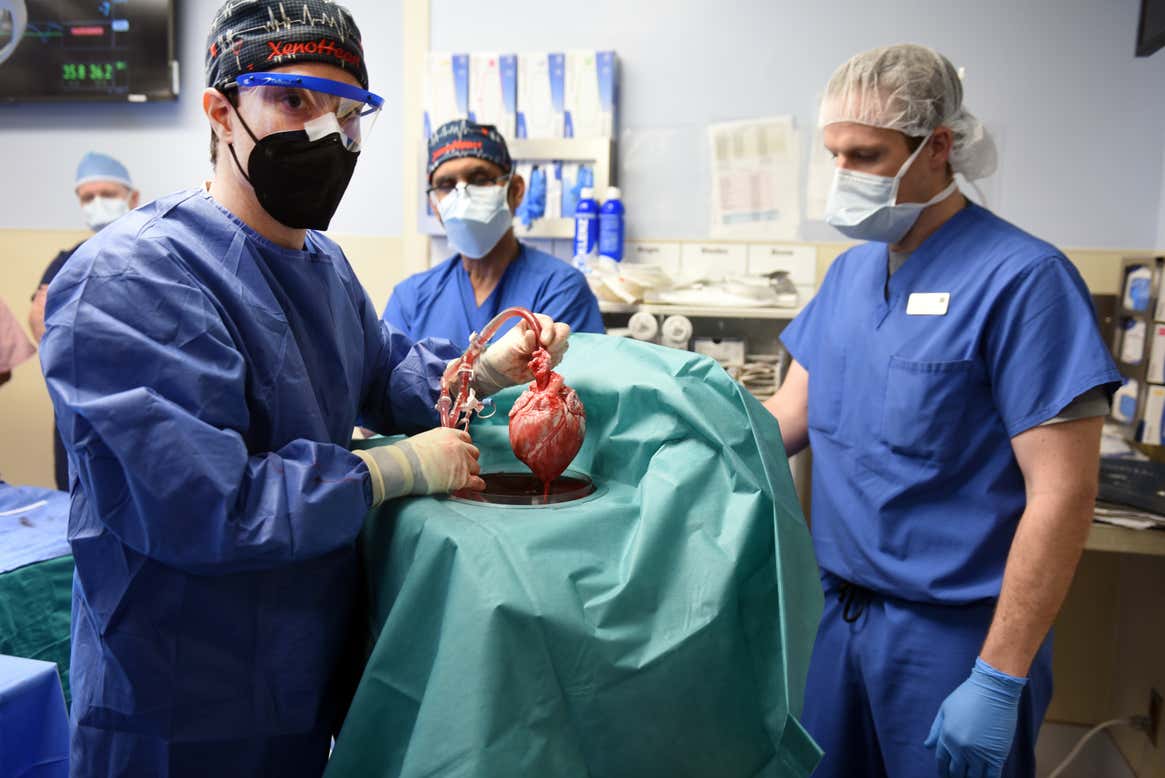David Bennet Sr. died two months after becoming the world's first person to receive a genetically modified pig heart in a transplant operation.
 |
| Photo: University of Maryland School of Medicine |
Evidence of a virus that infects pigs was found in the body of David Bennet Sr., the recipient of a genetically modified pig heart in an experimental transplant surgery. Bennet died in March at 57 years old, two months after undergoing the last-resort operation, which was the first of its kind ever performed.
Now, his surgeon and others think that porcine cytomegalovirus likely played a role, according to reporting originally from MIT Technology Review. It’s a mixed finding with implications for the future of cross-species transplants, called xenotransplantation. On one hand, transplanting an infected organ should’ve been easily avoided and prompts further ethical concerns about an already fraught procedure. But it’s also possible that, without the virus present, Bennet could’ve survived even longer with his new heart.
Initially, the transplant, which was performed on January 7, looked to be a success. The heart was pumping strong, and Bennet seemed to be recovering in the first month and beyond—a critical stage for transplant patients. However, while still in hospital care, he took a rapid turn for the worse in early March. On March 8, Bennett died in the company of friends and family. “There was no obvious cause identified at the time of death,” a hospital spokesperson said following Bennet’s death, according to the New York Times.
But during a webinar in late April, Bennet’s surgeon, Bartley Griffith, presented more information. He revealed that the medical team had found evidence of porcine cytomegalovirus in Bennet’s system as early as 20 days post-surgery, but because the detected levels were so low (and the pig was guaranteed virus-free) the doctors initially thought it could be a testing error. Weeks later, a biopsy of the pig heart post-mortem showed that the organ was damaged, possibly by infection, reported MIT Technology Review.
“We are beginning to learn why he passed on,” said Griffith to MIT Technology Review. “[The virus] maybe was the actor, or could be the actor, that set this whole thing off.”
In a more in-depth description during the webinar, Griffith said the infection, which started small, built to massive swelling. “I personally suspect he developed a capillary leak in response to his inflammatory explosion, and that filled his heart with edema, the edema turned into fibrotic tissue, and he went into severe and unreversing diastolic heart failure,” he further said.
Although the porcine cytomegalovirus is incapable of infecting human cells, it may have caused complications with the heart itself and triggered a dangerous immune response in Bennet, similar to a syndrome seen in cross-species transplant experiments done on baboons with infected pig hearts, according to MIT Technology Review. Transplant patients rely on immunosuppressant drugs to prevent their bodies from rejecting donor organs, but, as a result, infections pose a particular threat and are difficult to treat.
The heart came from a pig specifically modified for the purpose of providing transplant organs. The pig, bred by the company Revivicor, had 10 different gene edits, most of which were meant to prevent the human immune system from attacking the pigs’ organs. But the pig was also supposed to be virus free. Prior to extracting the heart, the pig was checked for active viruses via a nasal swab, but porcine cytomegalovirus and other diseases can lie dormant, deeper in the body, as latent infections.
From MIT Technology Review:
However, the surgery was a last resort for Bennet, who wasn’t deemed eligible to receive a human heart and who was very sick prior to the transplant. It was either undergo the operation or face certain death from heart disease, according to a January press release, from the University of Maryland hospital where the surgery was done.
Joachim Denner, a virologist at the Free University of Berlin in Germany who led the baboon study, told MIT Technology Review that Bennett’s poor health was probably another factor in his death. “This patient was very, very, very ill. Do not forget that,” he said. “Maybe the virus contributed, but it was not the sole reason.”
Tags:
News
